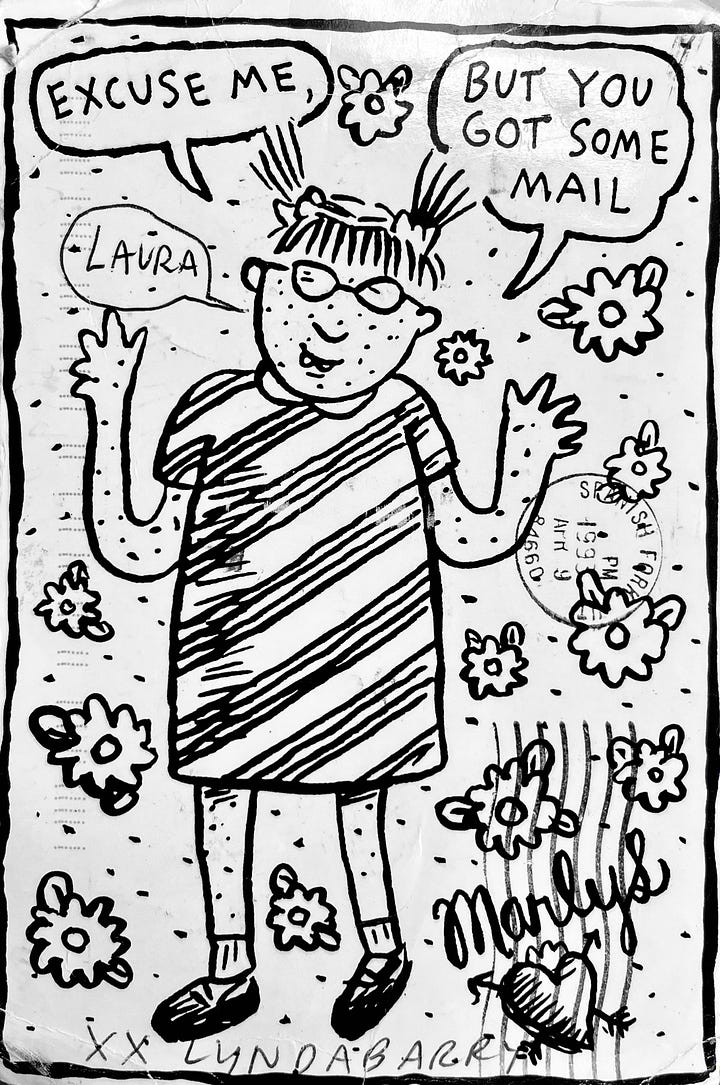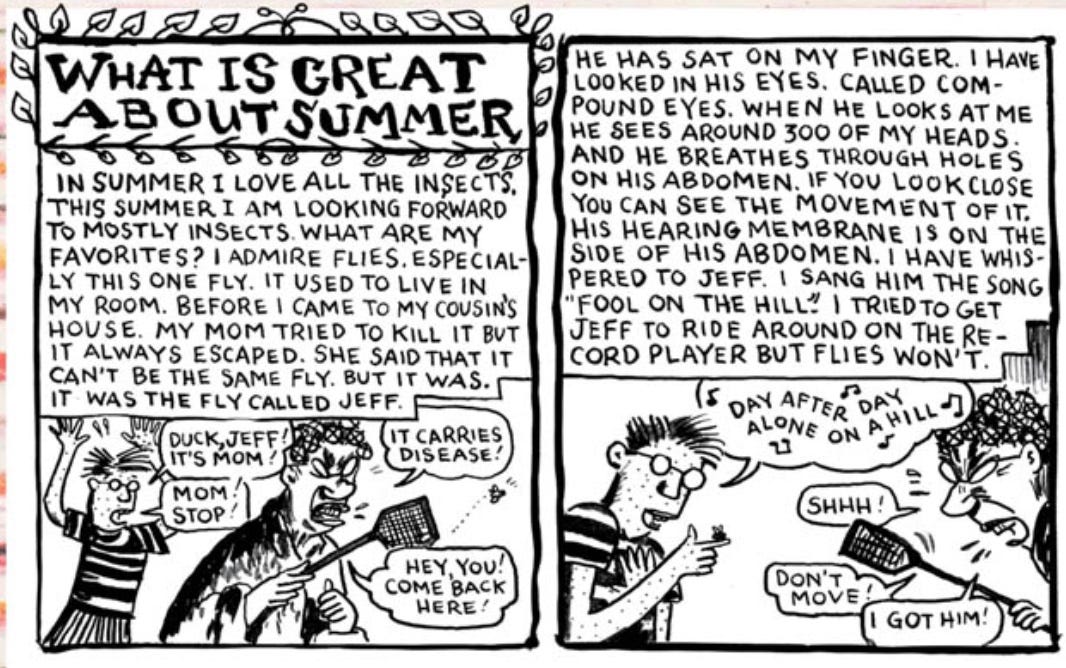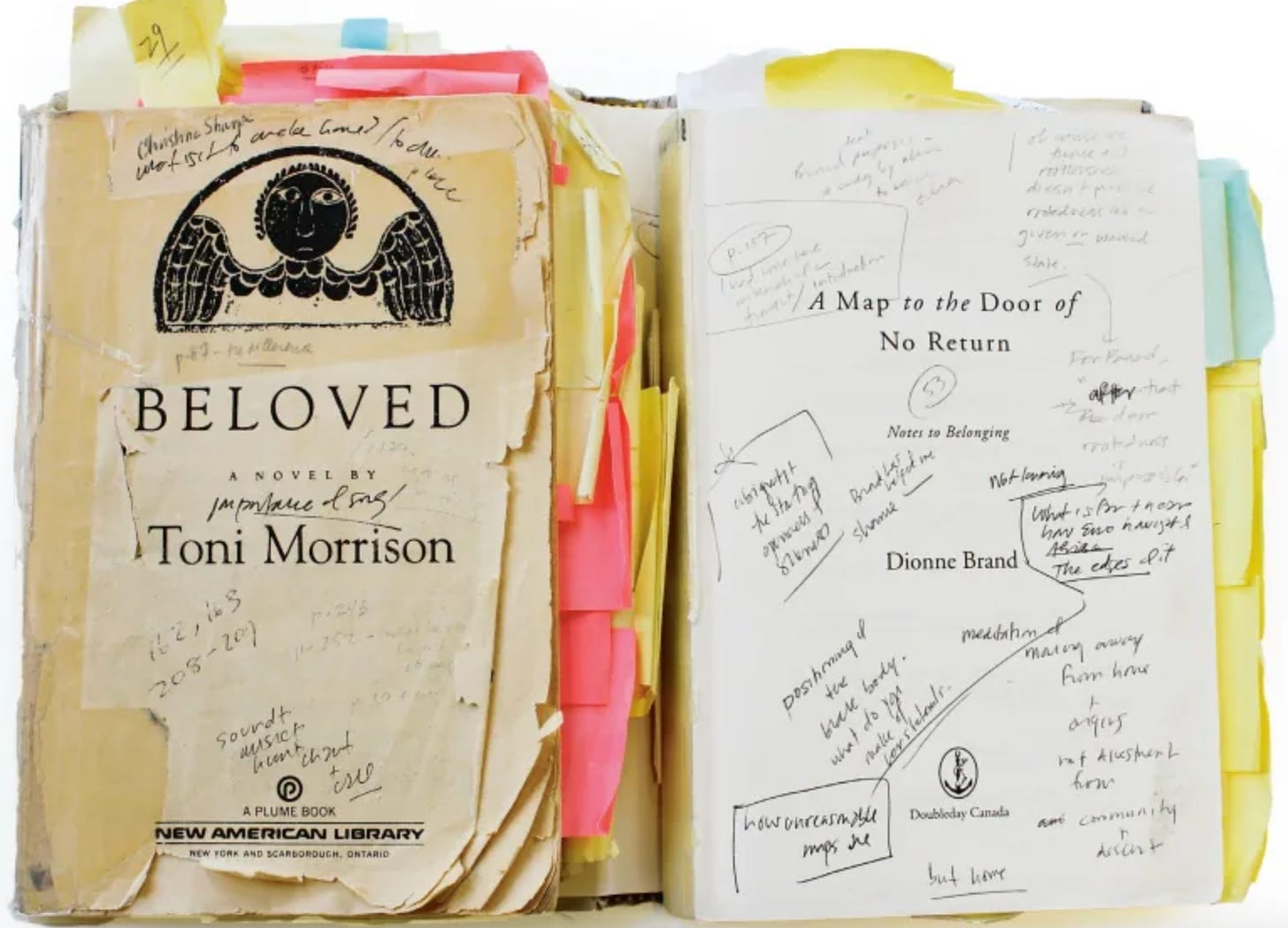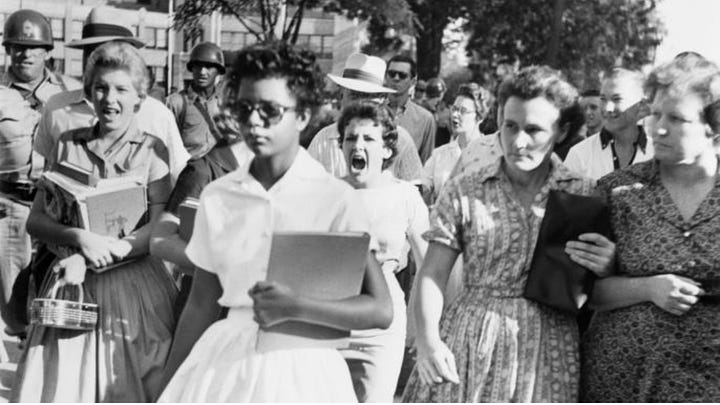Plus: A postcard from Lynda J. Barry and upcoming events in Portland and Clatskanie
Truth & Dare is a monthly post that offers one Truth (a writing prompt) and one Dare (an artistic gesture in the world). You might also find: thoughts on writing, art, books and paying attention. You won’t find: a paywall or a thicket of hyperlinks taking you someplace else. Just a clean read, a cup of herbal tea poured over your frontal lobe. No noise and distraction. Thank you for being here.

Back in college I used to hop a bus with a crew of fellow backslider-Mormon friends to escape Provo for the big city of Salt Lake. We’d go to Bandaloops Coffee Shop, (if you’re a student at BYU, just going to a coffee shop and drinking a mocha is pretty renegade) for the alternative weekly newspaper, where we’d read horoscopes by Rob Brezsny to learn what our futures held. We’d also seek out Ernie Pook’s Comeek by Lynda J. Barry, a refreshingly crudely drawn, (or so it appeared at the time, being unlike anything else), text-heavy weekly comic strip. We followed the story of Marlys and her brother Freddie, a sweet but weird kid who was an easy target for bullies. The story had begun to go in a pretty dark, disturbing direction, so I wrote Barry a letter to ask what the hell was going to happen to this dear, off-kilter character.

Her reply blew my mind. She thanked me for the letter and wrote, “Even I don’t know what is going to happen to Freddie. I never know until the week I write it. I sure hope things brighten up.” I guess I’d assumed that the creator of such a compelling story would be the one in charge, but even she didn’t see what was coming until she sat down and picked up her pen. I’ve learned for myself in the years since then that whatever I think I’m sitting down to write about will look quite different by the time the ink dries. And that’s not to mention the times I sit down with no clear idea at all, and have to lean on the process of writing itself to lead me where I’m going. Donald Barthelme articulates this better than I can:
The not-knowing is crucial to art, is what permits art to be made. Without the scanning process engendered by not-knowing, without the possibility of having the mind move in unanticipated directions, there would be no invention.

In April, I read 2 books together that turned out to be pretty strange bedfellows, only I now think it might have been an excellent accident to study them together: Ordinary Notes by Dr. Christina Sharpe and Rising Out of Hatred, by Eli Saslow.

Dr. Sharpe’s book is composed of a set of 248 notes that she says are “the ways in which we experience the world around us: the things we remember, taste, feel, reject, embrace, understand, refuse, imagine, love.” Its title comes from Toni Morrison’s Beloved, in which one of the novel’s protagonists, Paul D, ends up in prison where he has time look around himself and make “ordinary notes,” or as Dr. Sharpe writes: “to do the kind of thinking, recognizing each other, seeing each other, coming to trust and hold each other..” Dr. Sharpe calls the book a love letter to her mother, and many of the pages are dedicated to the stories of her mother’s efforts to steep Dr. Sharpe and her brother’s childhood in beauty, a life of literature and poetry. Her mother did her best to help her children build the fortitude necessary to navigate the ugliness of racism she knew they would encounter. I love the images in this book, the way each floats on its own page like art in a gallery, but my favorite image in the whole book is the one of Dr. Sharpe’s copy of Beloved and a copy of the poet Dionne Brand’s A Map to the Door of No Return:

Dr. Sharpe is also deft at pairing photos that require little commentary, like the one of Elizabeth Eckford surrounded by a white mob as she enters Little Rock Central High School, (1957) with one of white supremacists marching on the campus of the University of Virginia in 2017.

Rising Out of Hatred, Eli Laszlow’s book (2018) follows the story of Derek Black, a young man raised in the white supremacist movement (his father founded the neo-nazi forum Stormfront, his godfather was Ku Klux Klan leader David Duke). Black is himself a rising star in the white supremacist family business, when, after years of homeschooling, he decides to study history at the New College of Florida. When his noxious beliefs are exposed on campus, he is understandably ostracized by many students. But a handful of students refuse to write him off entirely, inviting him to their weekly Shabbat dinners, until eventually, he can no longer reconcile his hateful ideology with his affection for his friends who are a diverse blend of immigrants and Jews.
I’m struck by the fact that in both books, parents raise their children for the world they’ll inhabit, but one is in beauty/protection and the other ugliness/harm. I also learned more about the ways the white supremacist movement celebrated Trump’s election, how they cocked their collective head to hear his dog whistle. And they are doing it now, in the run-up to a new election. I was reminded all over again at the ways I have been insulated by my whiteness, the ways I could turn the radio off if it all felt too toxic. And the way so many don’t have this same luxury. I’m also reminded of the power that books have to liberate us. To uphold beauty and humanity and dismantle the ideas that oppress or kill us. It’s one thing we can do, in the face of overwhelm: Read deeply and then sit with the questions. Then read more.
This brings us to our monthly Truth & Dare.
Truth: Write about a time when you’ve had to rearrange what you thought you knew, or discard a belief that was no longer true for you, or wasn’t objectively true in the world.
Dare: Put on some music, cue up this video and draw a skeleton with Lynda J. Barry!
Oh yeah, Upcoming Events:
- Raymond Carver Writing Festival, May 17-18th, Clatskanie, OR (I’ll lead the Parking Lot Poetry on Friday, and later my sidekick Ben Parzybok and I will have a table together — come find copies of my book Loaners, learn about Street Books and Gumball Poetry—check out the schedule to learn more).
- I will be reading with my co-author Ben Hodgson at Gather:Make:Shelter on May 15, 6:30-8. Would love to see you there!
Brezsny is still at it. His website and aesthetic kind of reminds me of the text on a Dr. Bronner’s peppermint soap bottle…in a good way
If you haven’t encountered the work of Lynda J. Barry, run don’t walk toward it
Watch Dr. Sharpe speak about Ordinary Notes
Listen to Dionne Brand’s interview with David Naimon on “Between the Covers”
See Laslow in conversation with Oregon Humanities’ Adam Davis
Draw a skeleton with the one and only Lynda J. Barry